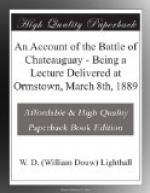* * * * *
It is the privilege of the men of Chateauguay to remember that their region is haunted by the spirits of heroes.
“The dead still play their part”
sings the Canadian poet Sangster, and here the musing thought must for ever conjure up De Salaberry, McDonell, the 800 waiting behind their breastworks in the gloom of the woods, the touching scene of Captain Longtin and his Beauharnois men, and the stubborn onset of Daly against overwhelming odds. The meaning of it all is: that given a good cause, and the defence of our homes against wanton aggression, we can dare odds that otherwise would seem hopeless; that it is in the future, as in the past, the spirits of men, and not their material resources, which count for success; that we need only be brave and just, and ready to die, and our country can never be conquered; and that we shall always be able to preserve ourselves free in our course of development towards our own idea of a nation.
APPENDIX.
NOTES BY W. PATTERSON, M.A.
1. Mr. James Walsh, Sr., who still resides in Ormstown, Que., was informed by one Saint Charles Moreau, alias Legault, that the stone house, situated on the Chateauguay about two miles below the village of Ste. Martine, and known during the early years of the present century as “The Stone Tavern,” had just been built and finished the day before the battle, and the officers of the Canadian forces unceremoniously took possession of it on coming forward that evening.
2. This same Legault or Moreau, shortly after the battle and before the dead were removed, visited the scene of the fight. There he saw several dead and several dying. He had a vivid recollection of the cruelty of the Indians. “The cursed savages,” said Legault, “did nothing to secure the victory, and yet were foremost in plundering the dead and dying.” He remembered in particular having seen an American officer, who was seriously wounded, lying on the field. The officer had a coin in his mouth which he was evidently anxious to save. An Indian, upon noticing this, bade him by making signs open his mouth and give up the piece. The command being apparently misunderstood, the Indian impatiently struck him with his tomahawk on the forehead. As his head was knocked back by the blow, the man opened his mouth, and his assailant taking out the coin passed on.
3. Mr. David Monique, who lived at the “Portage” (modern Dewittville) at the time of the war, used to say, as Mr. Walsh many a time heard him relate, that his impression was that the Canadians did not hang upon the American rear after the fight, for had they done so, the American guns, which were all left behind, would have been captured. A division retreated up the Island of Jamestown by way of the “Portage,” on the South side of the Chateauguay, passing on their route Mr. Monique’s farm.




